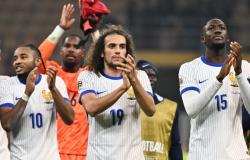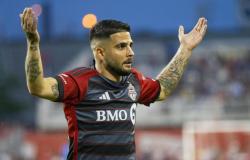Nick Suzuki woke up.
Or rather…he didn’t fall asleep on the plane.
Finally, Suzuki finally acted as captain of the Montreal Canadiens and marked a turning point in the team’s travel management by taking a bold initiative.
Tired of the sleepless nights on the plane and the resulting mediocre performances, he bypassed Martin St. Louis to go straight to speak with Kent Hughes and Jeff Gorton.
This gesture, linked to his dissatisfaction with taking the plane after the matches instead of spending the night in a hotel, was received with approval by management.
Result ? A completely renewed approach to team travel, with nights in the cities visited to maximize rest.
Everyone seems happy with this decision… except Alex Newhook, who is not convinced by this change.
Still Newhook whining for nothing.
The turning point for Suzuki came after a series of grueling trips. Among them was a trip to St. Louis after a game in Arizona, where the team arrived at the hotel at 5 a.m.
This chaotic night not only exhausted the players, but also led to a crushing 6-3 defeat against the Blues.
At the end of last season, Suzuki, supported by Mike Matheson and David Savard, decided to push management to review the team’s travel methods.
“Sometimes we did things that didn’t make sense”recalled Matheson, in an interview with Guillaume Lefrançois of La Presse.
Suzuki, for his part, explained to La Presse that these changes were intended to offer players better recovery.
“In Washington, I was able to go to bed even before the time we would have landed in Pittsburgh. It was nice to be in bed before midnight and get a good night’s sleep,” confided the captain.
Since this discussion between Suzuki, Hughes and Gorton, the Habs have adopted a different strategy. Rather than traveling immediately after games, the team now spends the night in the city where it plays. Three recent examples show the benefits of this decision according to La Presse:
Washington (October 31): After practice the next day, the team continued to Pittsburgh. Result: a close defeat, but with better rested players.
Toronto (November 9): The night at the venue resulted in a dramatic 7-5 win over the Sabers in Buffalo.
Minnesota (November 14): Staying in Minneapolis after the game, the players enjoyed some off-ice training before returning to Montreal and winning 5-1 against Columbus.
According to David Savard, who had already experienced this type of management when he played for the Blue Jackets, a good night’s sleep makes a huge difference:
“A restful night after a match is much more beneficial. »
Sleep specialist Dr. Jonathan Charest also supported this decision, emphasizing to La Presse that sleeping on a plane or interrupting a night for a trip alters the rhythm of a professional player.
“The players are like night workers. They cannot be optimal with choppy nights”he explained. He even described this new method as a “healthy revolution” for the well-being of players.
But be careful. Not everyone is convinced. Alex Newhook, one of the team’s new additions, expressed a preference for traveling immediately after games, especially when the next city is nearby.
“It often takes a long time to calm down after a match. As long as you don’t sleep before 1:30 or 2 a.m., you might as well travel right away.” he declared.
This opinion, although in the minority, shows that this change is not yet unanimous.
It must be said that Newhook is often alone in his corner when it comes to having an opinion on the functioning of the team.
This first big gesture from Nick Suzuki as captain marks a clear response to those who criticized his leadership.
Long accused of nonchalance and of not fully embodying his role, Suzuki demonstrated that he was ready to make decisions to improve the performance and well-being of his teammates.
He bypassed the coach to speak directly to management, showing he had the confidence to defend his ideas.
This gesture not only reinforced his authority in the locker room, but also proved that he is ready to live up to the expectations that come with the “C” on his jersey.
The Canadian now seems on a better path, with a modern and scientific approach to managing travel.
This decision, seemingly innocuous, could have positive long-term repercussions, both on and off the ice.
Nick Suzuki, through this gesture, not only showed that he was capable of meeting expectations on the ice, but also that he could be a true leader of men off it, capable of thinking about the collective good.
He will now have to maintain this dynamic of authority and continue to show that he is up to the demands of a market as ruthless as that of Montreal.
While this move is a promising start, the real test will be whether he can replicate this leadership in other aspects of his role.
For now, Suzuki can rejoice: he has not only earned a better night’s sleep, but also the respect of his teammates and fans.
A first step towards a star that shines again.
Newhook is really the only one who likes to spend sleepless nights on a plane, like those the Canadian has often experienced in the past.
No matter what he thinks, these trips are exhausting for high-level athletes. After a match ends near 10 p.m., players must first go through a series of steps before they can board a plane: post-match interviews, shower, quick meal, and transportation to the airport.
Departure formalities, sometimes aggravated by customs controls, push back the take-off time even further.
Result: the plane often does not leave the ground before midnight, or even later.
Even on a comfortable plane, sleeping remains a challenge. Reclining seats are no substitute for a bed, and vibrations, engine noise and flight attendant movements disrupt players’ sleep.
Once they arrive at their destination, around 2 or 3 a.m., they still have to go to their hotel, check in and finally go to bed, often around 4 a.m.
This fragmentation of sleep, as Dr Jonathan Charest explains to La Presse, has devastating consequences on the biological clock of athletes.
A night cut by no more than 4 hours does not allow the body to fully recover, because deep sleep cycles, essential for growth hormone production and muscle repair, are interrupted.
This can leave players exhausted, with prolonged recovery time and horrible performance in future matches.
In this case, Nick Suzuki proved that he understood the needs of his team. Suzuki took responsibility as a leader.
No offense to grumpy Newhook.




